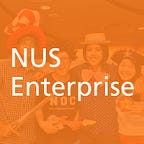Interview with Remotely — Winners of APIWorld Hackathon 2017
Following their success at the APIWorld Hackathon 2017 where Remotely achieved Overall 1st Place and won the Back4App category, we took the chance to speak to team members Leon Mak, Ong Qi Yong and Ngin Yun Chuan from the NUS Overseas Colleges Silicon Valley programme to find out more.
Remotely is a platform that allows you to verify service providers that are entering your house, conveniently from your mobile device.
So, how did you guys conceive of this idea?
Yun Chuan: Before the hackathon, we read up on the sponsors and their APIs, brainstormed individually and as a group, and bounced ideas off one another. In our discussions, some of us recalled having the pain point of not being able to let a deliveryman or repairman into our houses as we were always at work in the day, and thus we built upon that idea.
Qi Yong: We brainstormed a lot of ideas, and narrowed it down along the way, with a lot of preparation done before hand. We were quite confident of winning as we participated in a lot of hackathons together (TechCrunch Disrupt SF, Chime4Hack) and a few of us were in the same group for New Venture Creation (NVC) and TR4049.
What was your biggest takeaway/lesson from participating in this hackathon?
Leon: My biggest takeaway is that it’s not over till it’s over. I encountered many issues with some of the SDKs while developing on iOS, so we had to revise our initial mock-ups but still try to preserve the core idea. Even until the end, I was uncertain if we would even win anything but despite that feeling I think we all believed in the idea and pressed on. I was coding, in the car and at the venue until around an hour before the deadline! Seeing the demos go smoothly and the sponsors’ positive reactions was more satisfying than winning a prize.
Yun Chuan: In a hackathon, since you’re pressed for time, there’s this tendency to be engrossed in coding the product after the idea has been decided. But what’s more important is, before any coding, crafting out the demo in detail — as a team — and prioritising those aspects/screens that must minimally work for the demo to go smoothly.
What was the toughest part of the hackathon?
Leon: Hardest part for me was the execution of the idea. We had to adapt to the difficulties of integrating the APIs, some of which still had unresolved issues, divide up tasks when the tasks themselves were moving targets, and then connect all of our individual pieces to get one smooth looking product to demo.
Qi Yong: We faced different difficulties during the hackathon itself but overcome most of them by capitalising on each other’s strengths. We also managed to stick to original plans quite well!
Yun Chuan: The toughest part was integrating all the APIs we wanted to, and making the compromise between better and richer integration of the APIs and being sufficiently prepared for the demo, under the given time constraints. It was a struggle to understand the APIs, concepts, and technicalities involved to integrate DocuSign and Hypertrack, as we faced issues doing so. Ultimately, instead of rushing to integrate Wowza’s live streaming to complete our idea, and we decided to allocate more time to polishing up the app and demo.
How did you feel when Remotely was announced as the overall winner?
Leon: It was generally a feeling of disbelief. I think despite our demo being less polished than other teams, our demo hit the right notes with the judges, integrating various APIs on different platforms (Mobile, IoT).
YC: When we heard that our team was top 5, we felt excited to be able to present our idea on stage. On stage, we felt that we did not showcase our product as well as we intended, and when it was announced that we were overall #1, we were in disbelief. After the pleasant surprise, we were very appreciative of one another’s contributions and commitment (most of us didn’t really sleep for one night!).
You can check out a video of Remotely’s app demo here: https://www.youtube.com/watch?v=3qmP_1J4VRk
Our NOC Silicon Valley students are planning to take part in the upcoming 2017 Money 20/20 Hackathon. Stay tuned from more updates!
